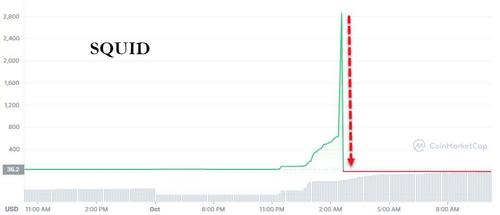Feature your business, services, products, events & news. Submit Website.
Breaking Top Featured Content:
‘Squid Game’ Crypto-Scam Exposed, COIN Crashes 100% After Explosive Gains
Update: Following up on what we detailed yesterday, CoinMarketCap issued an even firmer warning:
“We have received multiple reports that the website and socials are no longer functional & the users are not able to sell this token in Pancakeswap.
Please do your own due diligence and exercise extreme caution.
This project, while clearly inspired by the Netflix show of the same name, is not affiliated with the official IP. “
The Squid Game token rocketed in price from around 1 cent on Tuesday to trade around $38 late Sunday, according to CoinMarketCap data. It then stepped up to around $90 early Monday, then spiked to just above $2,861 before falling to $0.003467 at 10 a.m. ET.
“The scam has completed its cycle, and the price has just dropped significantly,” Bobby Ong, co-founder at CoinGecko, told Insider.
“Website and social media accounts being deleted is a very obvious sign that it is a scam.”
CoinMarketCap reports that SQUID’s inflexible tokenomics has caused many investors to lose a lot of money.
Describing Monday’s brutal crash, one SQUID holder told CoinMarketCap:
“The price was multiplying at an abnormal level. And as I was staring at my computer screen, I watched SQUID fall down in a matter of minutes. There was no way to withdraw my funds intact.”
They said they were drawn in by news outlets that gave attention to SQUID — and that this additional marketing made them feel that the project was genuine:
“I guess this will serve as a valuable lesson for me to not just jump into meme coins … I am not blaming anyone except myself, but I think there must be some mechanism to avoid this in the future, and for news outlets to stop giving attention to these scammer type tokens.”
Others describe how their $57 investment surged to $14,000 — and their frustration at being unable to sell their token.
Another victim told CoinMarketCap “I lost all of what I have in this project.” He had bought 5,000 SQUID at $1 apiece.
“I don’t trust in them anymore,” he added.
Crypto investors are regularly encouraged to scrutinize a project’s website to see whether information about the founders is prominently displayed.
Squid Game’s website did this — naming David Kanny as CEO. He was described as a University of California Irvine alum who had five years’ experience at Netflix, but no LinkedIn profile exists. Searches for other named executives — Mabel Jah, Kevin Sam, Christian Abbigail, Daniel Jolia and Lawrence Dan — also drew blanks on Google.
In the Netflix show, Squid Game depicts characters who are willing to put their lives on the line for a better financial future.
But for those who put their money on the line by investing in SQUID, any hope of a better financial future has now been lost in the blink of an eye.
* * *
The hit Netflix series “Squid Game” has inspired a new cryptocurrency, which saw its value skyrocket by 40,000% this week in just a handful of trading days.
As of 0745 ET Friday, the “Squid Game” token, aka “SQUID”, stood at $5.41, up from $0.01235 when it started trading on Tuesday, according to data from Coin Market Cap.
The relatively obscure crypto is up more than 200% in the past 24 hours and it now commands a market capitalization of more than $419 million.
While the rapid spike in price may tempt more traders into the coin, CoinMarketCap warned on its site that some people appear to not be able to sell the coin once they buy it.
“We have received multiple reports that the users are not able to sell this token in Pancakeswap. Please exercise caution while trading!” CoinMarketCap warns. Pancakeswap is a popular decentralized cryptocurrency exchange.
The inability to sell the coins could be tied to an “anti-dumping mechanism” that the creators of the coin described in a white paper associated with the cryptocurrency.
Like the South Korean show “Squid Game” in which 456 deeply indebted people compete in deadly children’s games for a grand prize of more than $38MM, the Squid token was launched as a way to buy into the Squid Game project, a crypto play-to-earn platform that will culminate with an online in a squid-game-esque tournament next month.
The online tournament will mimic the six rounds of games featured in the hit series, but, as the white paper says, “we do not provide deadly consequences.”
“Your experience will only reflect on the joy of winning rewards and sorrow of losing money when the game failed,” the white paper says.
Another difference is that the online tournament will not cap the reward money for winning nor will there be a maximum number of players.
Contestants will have to fork over a preset amount of the SQUID token in order to compete in each round of the tournament. At the crypto’s current price, the fee for the final round of the tournament, for example, stands at roughly $81,000.
Entry fees from each of the rounds are split between developers, who said they’ll take 10%, and the reward pool, where the remaining 90% of the coins will be deposited.
At the crypto’s current price, the fee for the final round of the tournament, for example, stands at roughly $81,000.
And throughout the tournament, players will have the opportunity to earn non-fungible tokens, or NFTs, by winning rounds. The NFTs also appear to be for sale on the behind the token’s website, and they can be traded among contestants.
Throughout the game, users will also earn Marbles Tokens, which is another reference to the show. Those tokens will allow users to eventually sell their SQUID coins and cash in, according to the white paper.
Of course, while the international crypto community has embraced the game, the NYC school system sees the trend as a liability, and has banned all students from dressing up s characters from the show for halloweem
Tyler Durden
Mon, 11/01/2021 – 13:33
Continue reading at ZeroHedge.com, Click Here.


